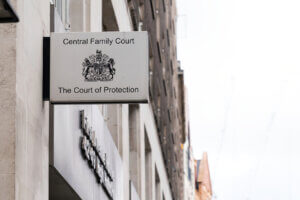What is “Self-Help” in Divorce Proceedings?

Contact
Table of Contents
One of the first things we explain to clients who are getting divorced is that, when it comes to financial matters, there is a duty on both spouses to provide each other with a full, detailed picture of their financial situation. If the matter comes to court and it appears that one party has tried to hide the full extent of their assets the court can infer the existence of the additional assets and make cost penalties against the dishonest party.
There are various steps that can be taken if your partner has not revealed all their assets, but one of the easiest is to present documents that you have found yourself showing that assets exist that have been left out of your partner’s disclosure. This article looks at what you can and cannot do if you come across useful-looking documents, or you think you know where you might find some, as well as the extent to which you can take investigations into your own hands without getting into trouble.
Hildebrand v Hildebrand
The extent to which these actions (known as ‘self-help’) are acceptable was first explored in the case of Hildebrand v Hildebrand in 1992. Mr Hildebrand had secretly taken photocopies of financial documents he had found in the family home. Following the initial exchange of financial information, he prepared a list of questions for his wife to answer based on information in the photocopies. The judge ruled that it was not fair for him to try to ‘trap’ her in this way without first providing her with copies of the photocopies and established the principle that such documents should be revealed before questionnaires are exchanged. He also made it clear that although copies of the documents could be kept by the self-helper, original documents should be returned promptly to their owner.
The judge in Hildebrand was reluctant to comment on whether taking photocopies was itself acceptable. This was explored soon after in the 1994 case of T v T, where the judge concluded that Mrs T had acted reasonably in taking photocopies of documents but had gone too far in using force to obtain documents and intercepting her husband’s mail. The documents she had found were still admitted as evidence, but she was ordered to pay her husband’s legal fees as a punishment.
Taken together, these cases have established the ‘Hildebrand rules’, which were summarised by Lord Justice Ward in the case of White (below) as follows:
“The Family Courts will not penalise the taking, copying and immediate return of documents but do not sanction the use of any force to obtain the documents, or the interception of documents or the retention of documents nor I would add, though it is not a feature of this case, the removal of any hard disk recording documents electronically. The evidence contained in the documents, even those wrongfully taken will be admitted in evidence because there is an overarching duty on the parties to give full and frank disclosure. The wrongful taking of documents may lead to findings of litigation misconduct or orders for costs.”
Recent Developments
Although the Hildebrand rules have been considered good practice for over 15 years, a number of recent cases have questioned whether a spouse who copies documents within the rules can nevertheless be sued for damages in the civil courts. The law has also been reconsidered in the light of the huge increase in email and computer-based information. A clear answer has not yet been given, which is a serious concern for anyone hoping to hunt for revealing documents.
In L v L (2007), Mrs L was worried that her husband would delete or destroy relevant documents saved on his laptop computer and so arranged for copies to be made of its hard drive. Her husband successfully obtained an injunction preventing her or her advisors from accessing the drive. The judge found that the drive contained confidential documents, as well as ‘privileged’ documents (such as correspondence between Mr L and his solicitors), that Mrs L should not be allowed access to. He also noted that there was a real possibility that Mrs L had committed offences under both the Data Protection Act 1998 and the Computer Misuse Act 1990 (see below) and suggested that the fact that the drive was copied for the purposes of litigation was unlikely to provide an adequate defence if Mrs L were to be prosecuted for these offences.
White v Withers
In White v Withers (2009), celebrity chef Marco Pierre White brought civil proceedings not only against his wife but also her solicitors, claiming that she had intercepted and retained his post and that he should receive damages. His initial application in the High Court was struck out, but the Court of Appeal reinstated his case, referring it back to the High Court for a full hearing.
It was accepted in this case that Mrs White’s actions had gone beyond the scope of the Hildebrand rules. Discussing whether this would have made a difference, Lord Justice Ward expressed “tentative views” that compliance with the rules would not be a good enough defence to a claim for damages, at least if some loss to the other spouse could be shown. Another of the judges, Lord Justice Wilson, strongly disagreed and said that he opposed the idea that rules allowing such documents to be given in evidence in one court could co-exist with civil liability for obtaining them in another. These comments were not binding, but demonstrate that the law on this point is not settled and that urgent clarification is needed.
This guidance may be on its way. In Imerman v Imerman (2009), the wife’s brothers had accessed and downloaded thousands of documents from her husband’s work computer, which they had passed to her solicitors. The husband sued the brothers in the civil court for breach of confidentiality and obtained an order preventing them from passing any more documents to the wife or her solicitors. In the family courts, he argued that some of the documents held by the wife were ‘privileged’ and the judge ordered that the husband was allowed to remove such documents from the files before returning them to the wife later this year. Both decisions have been appealed and are to be heard together. In granting the appeal, the judge referred to Lord Justice Wilson’s comments in White and stated that “there is a need for the courts to clarify the current situation”. With any luck, the Imerman appeal will do just that.
Practical Steps
Not everyone can wait until the Court of Appeal has had a chance to consider that appeal. You should always check your individual situation with a solicitor, but the following is a general guide to what may or may not be acceptable behaviour:
What you cannot do (criminal offences – punishable by fine or imprisonment)
- Intercept mail or tap telephones (s1 Regulation of Investigatory Powers Act 2000)
- Knowingly obtain personal data without the permission of the ‘data controller’ (this will be your spouse if you are accessing their documents or the third party if you are trying to obtain information from a bank/employer etc) (s55 Data Protection Act 1998)
- Access a computer without authorisation, including downloading and copying of files if you are not permitted to log on to the computer (s1 Computer Misuse Act 1990).
- Do anything to ‘impair’ a computer (such as sending spyware, installing key-logging software or taking any steps that will cause the computer to leak out information without the knowledge or permission of the owner) (s3 Computer Misuse Act 1990)
- Enter or remove documents from any sealed location (for example a property, room or cupboard, etc) to which you do not have a right of access, or use any force to access that location (Theft Act 1968)
- Any other criminal activity
What you cannot do (non-criminal wrongs – consequences may be damages, costs in family proceedings or creating a conflict that requires your legal representatives to withdraw from the case)
- Remove documents which do not relate to your spouse’s financial situation
- Remove documents which are ‘privileged’ (such as correspondence between your spouse and their legal advisors)
- Keep original documents longer than required to take copies (Lord Justice Wilson in White suggested a maximum of 2 clear working days)
It is also important to note that it is not possible to absolve yourself from liability, either for the criminal or civil wrongs listed above, by instructing someone else to do them for you, even if you are not aware of the precise methods they are employing. Anyone considering instructing a private investigator to look into their spouse’s affairs should first agree clear terms of engagement prohibiting the investigator from using unlawful methods to acquire information.
What is currently unclear (previously thought to be acceptable under the Hildebrand rules)
- Take copies of, or remove for the purpose of taking copies, documents to which you have access, such a papers left lying around in the family home
- Take copies of, or remove for the purpose of taking copies, documents which have been discarded by the other spouse (provided you do not need to trespass on somebody else’s property to do so)
- Access and print documents stored on your personal or shared computer which are not password protected (but not if you need to rely on access acquired, for example, by being network administrator)
What you must do (Hildebrand rules)
- Keep original documents only for as little time as you need to photocopy them, and in any event for no more than two clear working days
- Replace original documents where you found them, or alternatively return them by post to the other spouse (or their solicitors)
- Keep a record of the dates and descriptions of all documents taken
- Provide copies of all Hildebrand documents to your spouse (or their solicitor) no later than exchange of questionnaires, or sooner if requested
- Provide copies of all Hildebrand documents acquired after exchange of questionnaires to your spouse (or their solicitor) as soon as you discover them
Conclusions
Self-help is often one of the most useful and effective ways of proving to the court that your partner has been dishonest in the presentation of their financial situation. Urgent clarification is needed on what will be considered acceptable behaviour so that parties know what steps they can take without the risk of being sued or incurring cost penalties. Hopefully this will be given later this year, but until that time you need to think very carefully before taking matters into your own hands.
Share this article
Contact us today
Call us 020 7485 8811
Email us Send us an email and we’ll get back to you
Insights about Divorce Financial SettlementsVIEW ALL
- 4.7.2025
Standish Ruling: What Counts as Matrimonial Property
Supreme Court confirms only a valuable asset treated by parties as a matrimonial asset has been ‘matrimonialised’ The financial remedies...
Read more - 11.6.2025
Property Value Drop Won’t Change Financial Order
Drop in matrimonial home value is not enough to overturn a financial order, says Court The financial remedies team at...
Read more - 1.5.2025
Foreign Courts: Putting Non-UK Assets Out of Reach
Financial Remedies: could a party use a foreign court to put non-UK assets out of reach? The financial remedies team...
Read more - 11.4.2025
Evidencing Company Valuations in Divorce Cases
The importance of evidencing calculations of company values The financial remedies team at Osbornes Law represents clients where significant investment...
Read more - 1.4.2025
Company Valuations & Deferred Consideration
Company Valuations And The Status of Deferred Consideration Following from my previous blog I wanted to discuss the very important...
Read more - 17.3.2025
Selling a House in Divorce
A guide to amicably selling a house during divorce One of the biggest issues in divorce is what happens to...
Read more - 24.2.2025
How Are Finances Divided On Divorce?
Avoiding Misconceptions: How Are Finances Divided On Divorce? The financial remedies team at Osbornes Law advises divorcing clients across London...
Read more - 21.2.2025
Protecting Business Privacy in Divorce Financial Proceedings
Business owners: protecting privacy of confidential information in financial proceedings on divorce We represent many business-owners in financial proceedings on...
Read more - 27.1.2025
Financial Remedies: Company Valuation in Divorce Cases
Financial Remedies: The Company Valuation Challenge The tricky matter of business valuations often arises in the course of financial proceedings...
Read more - 4.11.2024
Anglo-French Divorce: Jurisdiction Guide
Anglo-French Divorce: which jurisdiction is right for you? It has been a year since we launched our Anglo-French department in...
Read more - 29.10.2024
Economic Disadvantage in Divorce: Can You Be Compensated?
Giving Up High Earnings: Can A Party Be Compensated For Economic Disadvantage? In financial remedies cases, the fact that one...
Read more - 24.10.2024
Can a Declaration of Trust Stand in Matrimonial...
Matrimonial Homes: Can A Declaration Of Trust Of Beneficial Ownership Stand? Resolving issues relating to ownership of the former matrimonial...
Read more - 23.10.2024
When Abusive Behaviour Affects Divorce Financial Relief
When is Abusive Behaviour Relevant To Financial Relief on Divorce? Domestic violence and other abusive behaviours are a contributing factor...
Read more - 25.9.2024
What Happens to Savings & Investments in Divorce?
Divorce often raises important questions about the division of assets, particularly savings and investments. Understanding what happens to these financial...
Read more - 23.9.2024
International footballer fails to comply with financial disclosure
UD v TQ: The importance of complying with financial disclosure Recent divorce case involving an unnamed international footballer is a...
Read more - 20.9.2024
Pension Attachment Order: A guide
Pensions are quite often valuable assets in a marriage. In some cases, they can be worth more than the family...
Read more - 11.9.2024
Financial relief after overseas divorce: a case study...
Can I claim financial relief after an overseas divorce? Obtaining a divorce in Algeria did not prevent a wife from...
Read more - 27.8.2024
Pension Sharing Orders
Pension Sharing in Divorce With so many things to consider when dividing up your finances during a divorce or dissolution...
Read more - 20.8.2024
What is pension offsetting?
In this article, we will explore the concept of pension offsetting and how it can play a crucial role in...
Read more - 12.8.2024
NA v LA [2024] EWFC 113: Judge Orders Non-Court Dispute...
Financial Claims: Judges Can Order Parties To Attempt Non-Court Dispute Resolution As was expected, the court has been quick to...
Read more - 1.8.2024
Standish v Standish: Court of Appeal Decision on...
Court of Appeal reduces wife’s divorce award by £20million Dealing with financial matters on divorce can be complex. And...
Read more - 1.8.2024
Matrimonial vs Non-Matrimonial Assets
Matrimonial vs Non-Matrimonial Assets in Divorce During a divorce, people often make the mistake of assuming that everything they own...
Read more - 1.8.2024
What is a Periodical Payments Order?
Periodical Payments Orders in Divorce Throughout the process of a divorce or when unmarried couples with children split up, numerous...
Read more - 1.8.2024
What is a Lump Sum Order?
A lump sum order is a crucial element of divorce settlements that can significantly impact the financial future of both...
Read more


























